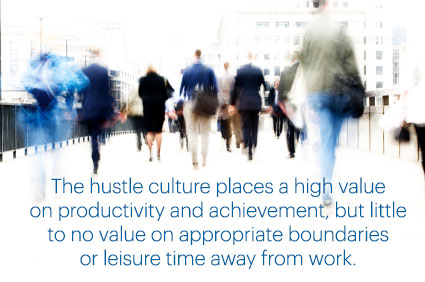Mixed Viewpoints on the Workplace Grind
By Mary Lynn Fayoumi, CAE, SPHR, SHRM-SCP, President & CEO
Published April 2, 2024
 While recently interviewing for an open position at HR Source, one candidate used various derivations of the word “grind” in response to my questions. For example, this enthusiastic applicant confidently stated, “I’m no stranger to grinding,” and “I’m ready to get back into the grind,” which were clearly intended to impress me in this final round of the selection process. While I pride myself on staying abreast of workplace trends and popular vernacular, these comments didn’t resonate with me and have led to some research, self-reflection, and enlightening discussions with my team and industry colleagues.
While recently interviewing for an open position at HR Source, one candidate used various derivations of the word “grind” in response to my questions. For example, this enthusiastic applicant confidently stated, “I’m no stranger to grinding,” and “I’m ready to get back into the grind,” which were clearly intended to impress me in this final round of the selection process. While I pride myself on staying abreast of workplace trends and popular vernacular, these comments didn’t resonate with me and have led to some research, self-reflection, and enlightening discussions with my team and industry colleagues.
I’ve learned several important things following this uncomfortable interview experience. First, use of the word “grind” seems to be a trigger to more seasoned managers and leaders when the work being done in our organizations is referred to negatively. For those who have spent their careers in workplaces that were more formal and hierarchical, using language that might be considered slang or derogatory in a job interview seems unprofessional or even taboo. However, when debriefing on this topic with younger team members, their reactions could best be described as mildly entertained by the word choice.
While my informal, unscientific, post-interview survey yielded some interesting results, I did what most modern researchers do next - I turned to Google. When I entered “grind workplace,” more than 5 million results were instantly returned, and 39 million when I changed my search to “grind culture.” WHOA!!! Have I been asleep at the wheel? I hate to think so, but obviously there is a lot more to know about this subject.
In fact, the “anti-grindset” movement is a counter movement to the hustle culture that places a high value on productivity and achievement, but little to no value on appropriate boundaries or leisure time away from work. According to a BBC article by Megan Carnegie in Aprill 2023, “The hustle-culture narrative promotes the idea that there's always more to strive for: more money to make, a bigger title or promotion to secure and a higher ceiling to smash.” However, psychologists and wellness experts caution that the grindset mentality is akin to workaholism which eventually leads to exhaustion and burnout.
Advocates of anti-grindset workplaces encourage employers to implement policies and provide resources that promote employee rest and well-being. At the same time, it’s vital that employees also play a role by unplugging from technology, using their time-off benefits, and sharing workload concerns with management.
Based on my “grind-induced” research and reflection, I can proudly proclaim that I am both a recovering workaholic and an advocate of the anti-grindset movement. Still, I’m not a fan of the terms grind, grinding or anti-grind when used to describe work, but I’ll adapt as the workplace and workforce continue to evolve. I’m committed to leading by example so that my team and I can reap the bevy of individual and organizational rewards offered by embracing work-life balance.
Have you heard your employees use the word “grind” to refer to your workplace? (Have you done it yourself? ) What’s the connotation? Join the conversation with your peers on HR Exchange.